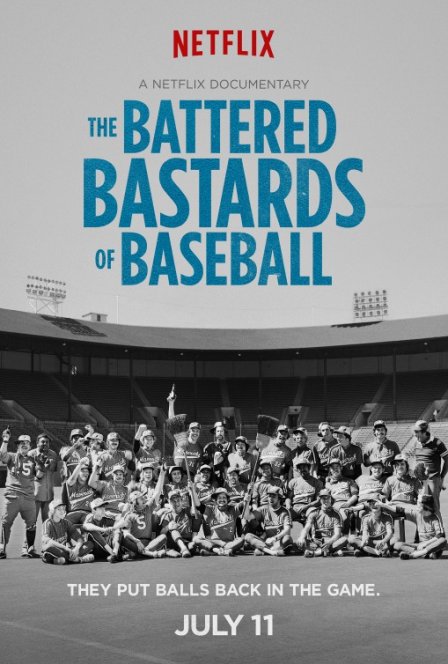Even if you don’t like sports or documentaries about them (full disclosure: that’s usually me), it’s pretty difficult to dislike The Battered Bastards of Baseball, the new documentary by brothers Maclain and Chapman Way (produced by/now available to stream on Netflix). It’s a Ken Burns doc soaked through with sweat and weed stink, Bad News Bears with a beer gut. It’s not perfect, but it’s pretty damn good.
The Battered Bastards of Baseball tells the story of the Portland Mavericks, who from 1973-77 were the only independent pro baseball team in the United States (all other minor-league teams, then as now, were “farm teams” for the majors). The team was founded on a wing and a prayer by larger-than-life character Bing Russell, who grew up as something of an off-season kid mascot for the Gehrig/DiMaggio-era Yankees, briefly played pro ball himself, and then went on to become a moderately successful Hollywood actor (during the latter, he played second fiddle to John Wayne and Steve McQueen, appeared as a recurring character on Bonanza, and died onscreen supposedly 126 times). When he grew tired of acting, Russell moved his family to Oregon in order to reignite his love affair with the baseball diamond, buying the local franchise rights for a ballpark figure (pun intended) of $500.
Somewhere in there, Russell started a family, which included his son Kurt and, later, this documentary’s makers (his grandsons, Kurt’s nephews). Kurt, who played for the Mavericks during the dawn of his own acting career, is interviewed extensively here, and his remembrances of his eccentric father are as warm and funny as anyone’s. That Bastards is such a family affair (another Way brother, Brocker, even composed the film’s score) puts the film at risk of becoming a celebrity family’s home video collection, but it skirts that issue adeptly. It’s briskly edited, well-paced, and wildly entertaining (I was fortunate enough to see it in a theater in Portland populated by rowdy old-school Mavericks fans, but hey, it’s my job to cut through that kind of outside stimuli).
The cast of characters read like something out of a Ken Kesey novel. Russell is obviously the film’s center, but “The Mavs” (as they were lovingly called) were littered with outrageous characters: Frank Peters, a local hustler/bartender/entrepreneur who had done some time in the minors, was hired on as manager; original pitcher Larry “Looper” Colton was a foul-mouthed hippie schoolteacher with a Manson-esque visage, who joined the Mavs because it was “a better alternative [for a summer job] than painting fuckin’ houses;” when Colton blew his arm out, ex-Yankees pitcher Jim Bouton, disgraced out of the majors for writing the behind-the-scenes exposé Ball Four, was called in as a replacement. They had a left-handed catcher, and one player, “Jogarza,” who would set a broom on fire whenever the Mavs “swept” an opponent in a series. At one game, no less than four players were thrown out for bad behavior, including bat boy Todd Field (yes, actor/filmmaker Todd Field). When the majors start sniffing around Portland in hopes of cashing in on the Mavs’ popularity, intending to cut Russell out and sand off the Mavs’ endearing rough edges, it’s hard not to boo and hiss at the squares even if you’re watching alone in bed.
One would be hard put to make a bad, or at least boring, documentary about all this, but Bastards doesn’t rest on its laurels. While it doesn’t tarry far from the well-worn tropes of modern documentary form (plenty of talking heads, cutely animated transitions, etc.), it wields them expertly. The Ways make excellent use of archival footage and avoid dragging the pace down with endless talking heads when that footage doesn’t exist. Brocker Way’s score can be confusingly dirgey in otherwise celebratory scenes, but it only really substantially throws the tone a couple of times.
The Battered Bastards of Baseball does nothing to reinvent the sports documentary form, but luckily, it doesn’t need to. With a story like that of the Mavs, just telling the story well is plenty.

